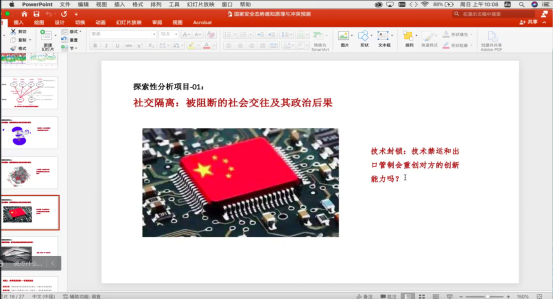On the morning of April 24, 2022, at the invitation of the School of Politics and International Relations of Lanzhou University and the Institute of Central Asian Studies of Lanzhou University, Professor Dong Qingling from the School of International Relations of the University of International Business and Economics gave an online academic lecture entitled "Principles and Application Scenarios of National Security Situational Awareness Based on Social Computing" to students and faculty members of the school. The lecture was hosted by Professor Chen Xiaoding, Vice President of the shcool, and more than two hundred teachers and students from both inside and outside the University attended the lecture.
At the beginning of the lecture, Prof. Dong Qingling introduced the Computational Social Science Lab in the School of International Relations of the University of International Business and Economics from the perspective of the lab's iconography, design and operation. The lab aims to solve two problems: the current lack of big data for social science research, and the problem of researchers having big data but being unable to perform computations.
Then, Prof. Dong elaborated on the topic of "Principles and Practice of Perceiving National Security Situation in the Digital Age" and some of the results achieved. The basic hypothesis of the study is that conflict events are the product of a combination of multiple social causes, with emotions and feelings being important triggering mechanisms.
After that,Prof. Dong introduced several exploratory analysis projects currently underway at the University of International Business and Economics. Prof. Dong observed through social experiments, including Experiment 1: Election Voting Experiment - Perturbation of Polls to explain how fake polls influenced the US election in 2016 and how Hillary was tricked into making wrong choices by fake polls? Experiment 2: Information transmission experiment - the effect of social distance on signaling to observe whether the distance of people and their interactions have an effect on signaling.

Finally, Prof. Dong pointed out that, as a naturally applied and cross-cutting discipline, the study of international relations has entered a whole new era. Faced with the complex interactive situation, researchers should use new technological tools to provide new perspectives for social problem solving. Big Data has brought an opportunity for the Chinese international relations community and even the whole social science community to transform as well as to keep pace with the international community, but it also faces many problems.
After the lecture, Prof. Chen Xiaoding gave a brief summary of the lecture. The lecture provided a new "window of opportunity" for the new generation of young scholars and a new and vital path of exploration for the students. The lecture not only enhanced the interest of our faculty and students in understanding and using new technological tools to study and solve problems, but also provided some inspiration and thoughts for students to conduct relevant research and study in the future.
